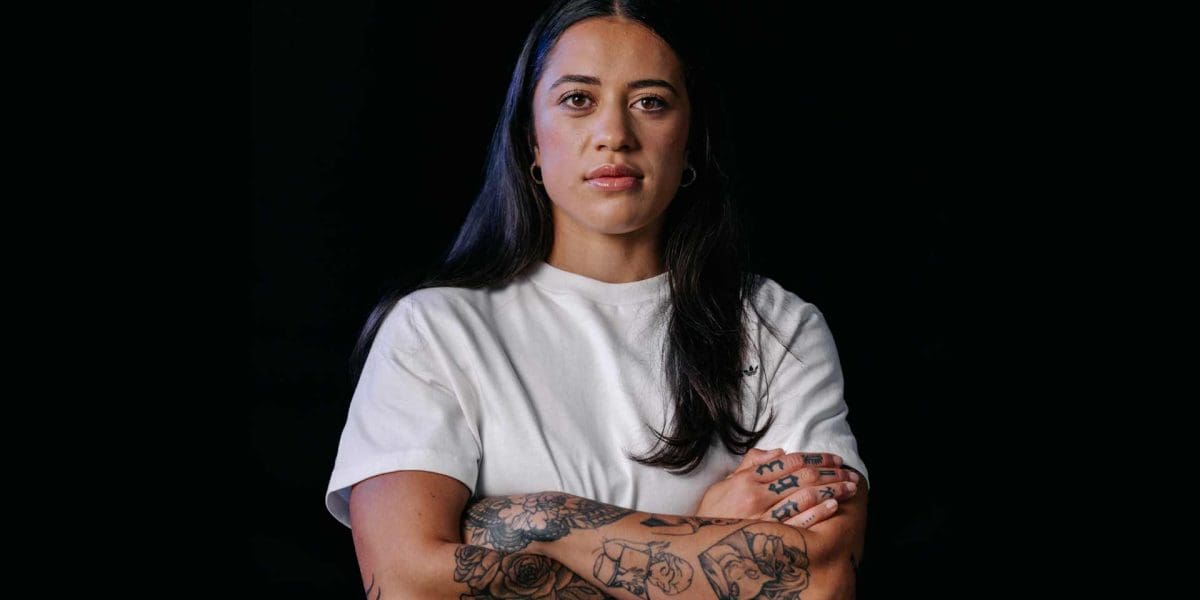Game Ready
There’s a quiet kind of power that comes with finally having something built for you. Not adapted, not borrowed, not made to fit after the fact. The RS15 Avaglide, adidas’s first rugby boot designed specifically for women, is one of those moments. Developed in collaboration with some of the world’s best players and backed by years of research, it signals more than just a design evolution. It is part of a broader shift in how women’s sport is seen, supported, and celebrated.
We caught up with three of the Black Ferns ahead of the launch, each of them bringing their own experience and insight to the conversation. Portia Woodman-Wickliffe has become a household name not just for her blistering pace and record-breaking try count, but for the way in which she has elevated the visibility of women’s rugby on the global stage. Now in her thirties, she remains a powerful presence both on and off the field, having recently returned from retirement to score seven tries in a single Pacific Four match. Maia Roos, still in her early twenties, has already become a core figure in the team, bringing a maturity and calm to the game that belies her age. She was the youngest ever player to start a Rugby World Cup final for the Black Ferns and is already shaping what the future of leadership in the squad looks like. Katelyn Vaha’akolo, who made her mark in rugby league before making the move to union, brings raw power and cultural pride to the game, and has fast become one of the most exciting players to watch in the build-up to the next World Cup.
As the Black Ferns prepare to defend their World Cup title, they do so as one of the most successful teams in New Zealand sporting history. With six World Cup wins and a growing global fanbase, they have helped redefine what high performance looks like in Aotearoa. The cultural impact of their success cannot be overstated. These are players who have opened doors for aspiring young girls across the country, helped drive the professionalisation of the women’s game, and reminded the nation that black jerseys do not belong to one code alone.
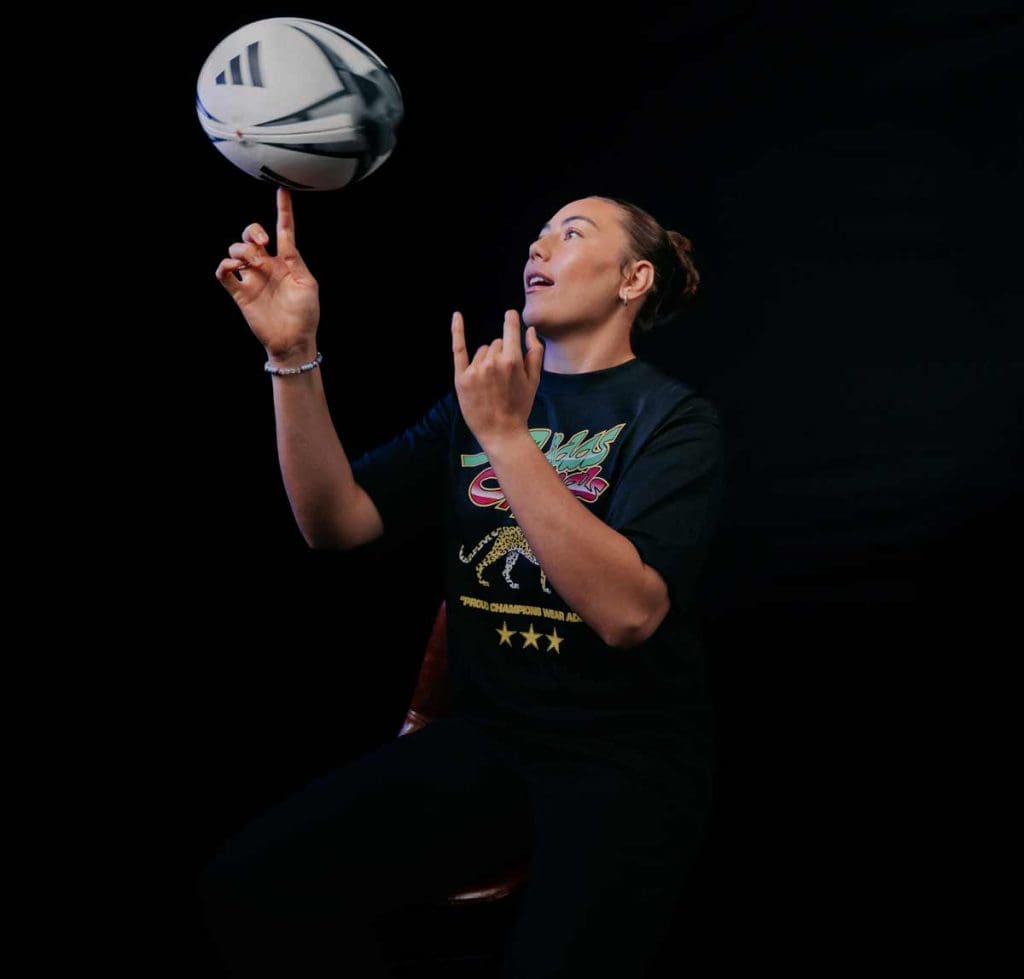
The latest iteration of that legacy comes in the form of a new jersey designed with input from Te Puia artist Teresa Murray. It features a woven Turapa panel that symbolises the strength of sisterhood and the multicultural heritage of the team. Every player was body scanned to ensure the fit was tailored to their position and movement. It is a design that honours the individual while reinforcing the collective. It is sport made personal.
In our conversation, the players share the pressures of elite competition, the importance of mental health, and the pride that comes from seeing their culture reflected in the jersey they wear. They also spoke about leadership, self-belief and the quiet moments that keep them grounded.
You’re heading into your next tour—how are you preparing mentally and emotionally for what lies ahead?
KV: I think a big thing, for me, is my mental wellbeing. It’s really important, in order for me to thrive in a performance environment, so I find I need to spend a lot of time making sure that I’m filling my cup leading up to campaigns. We’re obviously spending a lot of time away from whānau, a lot of time away from our safe spaces, so making sure my mental and emotional wellbeing is okay is a massive priority for me, and I take care of that by doing things that I love, doing things that make me happy, that are outside of rugby. And obviously, training really hard, so I can make the World Cup team.
MAIA: I’m pretty excited. It’s been a few years building towards this moment again; we’ve put a lot into the preparation over the last three years, and we’ve been training and playing together more than ever before. I’m just really looking forward to seeing how our team is able to bring everything together and flourish as a team in the lead-up to the second half of the year.
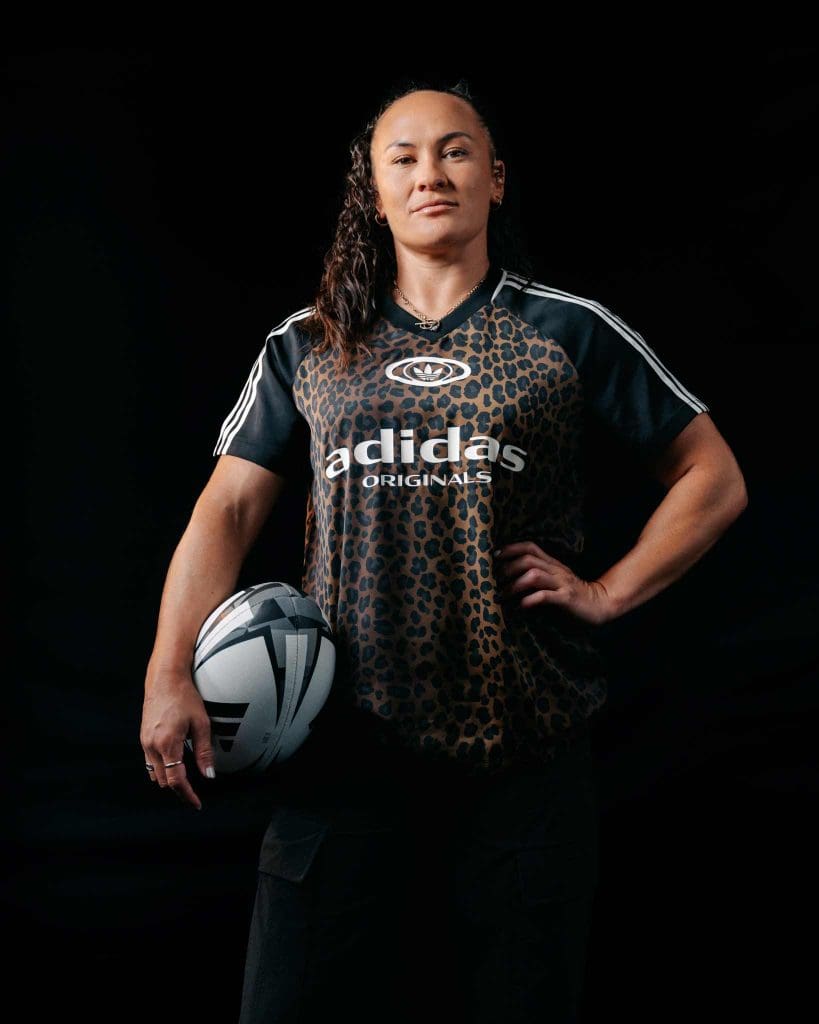
PORTIA: Heading into a tour, the week leading into it is getting as much time with whānau and friends, making sure my family is going to be alright while I’m going to be away. It’s banking sleep, getting recovery, understanding if it is a three-week tour, a week tour, or a full-week tour – making sure I’m clear on what the tour is. Is it a game, is it just camp, having the finer details really clear and understood by all of us in my whānau, so that when I leave, it’s not such a big shock and where everyone knows what’s happening. Mentally, emotionally, it’s a big deal because you’re going to be around a lot of people for a really long time sometimes and it’s just understanding when your body needs to switch off and when you need to create those connections and hang out with people whom you probably don’t hang out with; so understanding all of that and making sure that my family is going to be okay while I’m away.
From physical training to inner resolve, what does resilience look like in this moment for you?
KV: I think resilience looks like constantly having a growth mindset. I feel like sometimes I look at my progress and if I don’t feel like I’m progressing hugely, I feel like I’m failing. Resilience can look like a lot of different things – for me, it’s doing things for my emotional mental wellbeing, like I mentioned, but also just being proud of myself and allowing myself to be present at each moment. I often find myself always thinking about the next moment and struggling to stay present, and I think if I can be present in everything that I do, it can help me stay resilient.
MAIA: Resilience can be a lot of different things. When I think about my community at home, resilience is a really strong value that we hold. I think in this moment, it’ll be the resilience to keep training when it’s hard, resilience in the games if things aren’t going our way and being able to go back to our own processes and pick ourselves back up and carry on.
PORTIA: Resilience is about understanding the highs and lows of the professional game. Going through an injury, going through non-selection, losing a really pinnacle game or losing a game that you probably thought you could have won. Those moments, understanding that you’re allowed to feel upset, you’re allowed to feel gutted, that is a natural response; and understand that it doesn’t define us, it doesn’t mean that is the pathway we have to take. Understanding that moment, look ahead – what is our next path?
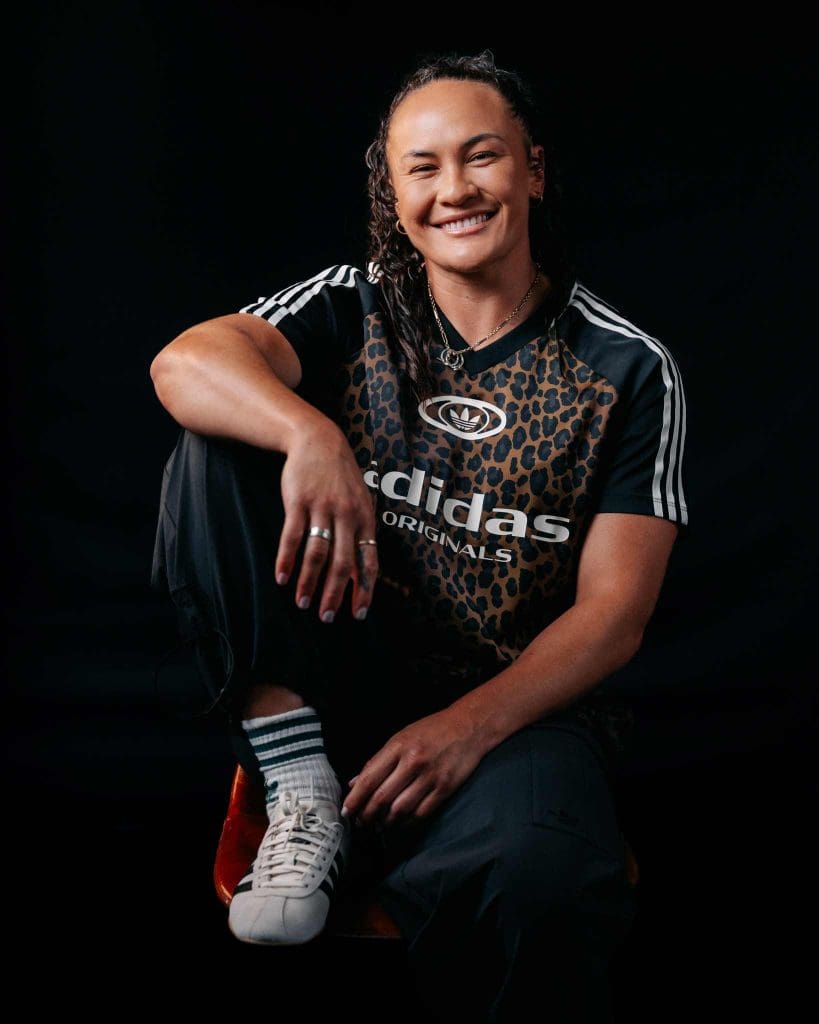
What I learned during my injury was the power of having a clear path forward and truly understanding it. Every two weeks, I’d get a new programme. I went from not being able to walk, to walking; from walking to running. I learned that the journey takes time, but it’s important to celebrate each milestone, every little moment you get to tick off matters. If you’ve come back from a loss, go back and actually look at the good things that we did, and there might be some really amazing moments in the game that just were perfect and then there were just moments that weren’t going our way. Resilience is having an amazing support base – having people who understand your lifestyle, understand who you are as a person, what makes you tick, what you need in moments of low. Do you want advice or do you just want to rant, or do you want support, or do you need to be left alone? Making sure you have those people around you and having them support you in the best way possible.
Women’s rugby continues to redefine the narrative in a male-dominated sport. What barriers have you had to break – on the field and beyond – and how has that shaped your approach to leadership?
KV: Some barriers that I’ve had to break through as a rugby player is the constant narrative that we just should be grateful for what we get. As women players, we deserve everything that we work for. There are women in this team who are mothers, there are women in this team who are police officers – we are so many different things, and I think we work really hard to get to where we are. There’s a bit of a narrative in women’s sports that you get what you get and you should just be thankful, because this is a male-dominated sport and your place isn’t really here, but I feel like this team, especially, is really breaking that narrative and that’s a real privilege for me to be a part of. There is also this perception that we’re not capable of being the best team in the world. That’s been a hard barrier to break through, but I think because we’re so connected as a playing group and we’ve all experienced similar things around being told that, as a woman, you shouldn’t be playing at this level… we don’t believe any of it – we’re women and we’re more than capable.
MAIA: Rugby has always been such a male-dominated industry, and I’m so fortunate to be where I am, at a time when women’s rugby is really on the rise and we’re being given more opportunities than ever before to train and play, and to be high-performing professionals. I joined the team when I was 18, so I was really quite young, but we were one of the first fully professional women’s teams in New Zealand for 15s. And so being able to have the privilege, I guess, of setting the standard of what a professional women’s rugby team looks like has been something that we’ve had to step up to. I think that kind of pressure helps my leadership abilities, because I want to be the best I can be, and I want young girls to be able to look at us and know that they can do the same.
Sport, like business, thrives on performance. How do you balance pushing for excellence with protecting your wellbeing and setting boundaries that prevent burnout?
KV: Yeah, I’m still figuring that out! I struggle because I’m obsessed with getting better. My goal is to be the best in the world. And I know that to be the best in the world, I have to work extra hard. It’s easy to forget that actually being the best in the world, sometimes means being the best at doing off-field things and balancing the two, and that’s something I’ve learnt over the last couple of years. I find that if I’m constantly obsessing over rugby and trying to better my performance, it actually makes me really unwell, and I start to lose my confidence a bit. So I think if I can give myself just as much off-field time as I do on-field time, it helps with preventing that burnout.
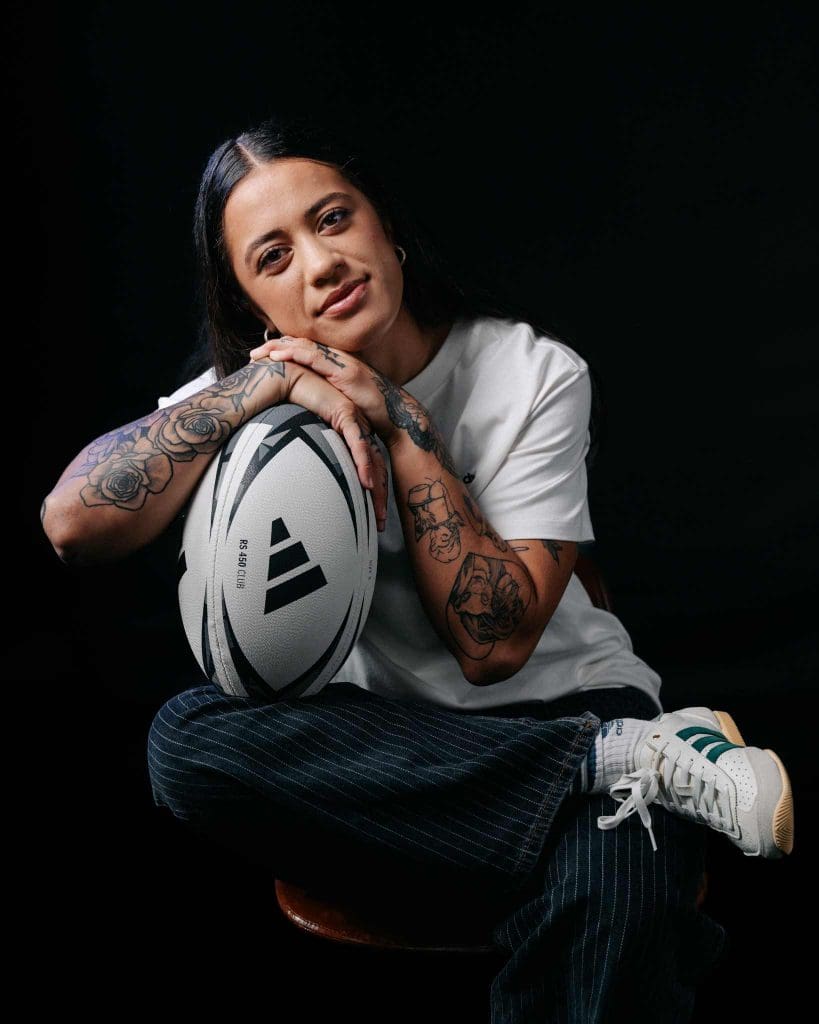
MAIA: I think knowing yourself and knowing your limits is a big one. Not everyone’s peak performance looks the same, and everyone’s weeks look different in order to be at their best at the end of the week. I say weeks because I like to take things week by week, as my performance cycle is usually one week at a time, which makes planning a really important step in preventing burnout. At the beginning of every week, I like to sit down, plan out my week and set smaller goals that feed into my big, overarching goal – one step at a time approach.
PORTIA: I think I’ve learned how to do this a lot more as I’ve gotten older. I’ve learned to listen to my body and I also understand what my body can and can’t handle. It comes down to how your body is feeling on that day; have I had enough sleep, have I had the right kai, has there been stress going on when my mind is a little bit drifted? It is understanding what it is that I get an emotional response from that can affect me physically and then understanding what I need from there. I’m really good at understanding that sometimes, I just need space from people, whether that’s taking a break from social media, or media, whānau, people you see in public who want some time from you. I know if I’m feeling low or my energy is low, we talk about my cup is half empty, and I need to go and fill it. Go and do the things that fill my cup. I love going to the beach, spending time with my whānau, reading or have some amazing kai with my whānau; those things fill my cup.
I think it’s also important to have a balance with rugby and life outside of rugby. What does that look like – a lot of it is whānau; my wife and daughter making sure I can spend as much time with them or getting to know what’s happening in their lives because we live such a fast-paced life. It’s so easy to just go a whole day without actually asking, “What happened in your day?” Like my daughter at school, “How’s your sports?” – so just getting time in with whānau, having a little check-in and ensuring we’re all on track, and if we’re not, what do we do next? But, it’s not easy. It’s working from 8am till 4pm and you’ve got to do all the things in between, and recovery and to make sure you’re performing and running on high, high levels, so getting time with whānau is my favourite thing and it keeps me going.
There’s growing recognition that women need gear – and systems – designed for them. What’s the most significant shift you’ve seen in women-specific design in sport, and how does it reflect a deeper shift in how women are being seen and supported?
KV: It’s been amazing to learn that adidas has created a boot for just women – how many other brands are out there doing that? Not a lot that I see! And I think it just shows that there are people and there are businesses that actually care for the success of women’s sport, and they actually want to see us succeed, not just in rugby, but in women’s sport in general. I feel like this is just a start. Although it probably should have happened a long time ago, I’m grateful that it’s happening now. I think it’s the start of something really big, and I hope that I get to continue to be a part of it.
MAIA: I think it’s so cool that we’re finally seeing women-specific gear coming through, because we’re not just “small men”, which has typically been the approach to the gear we’re provided with. We have very different bodies, so just to have gear that makes us feel seen goes a really long way. adidas introducing the new rugby boots, which are specifically designed for women, is a really monumental step in the right direction. The new adidas boot has added heel arches and support in the ankle that we need, and I feel so grateful that it’s happening now.
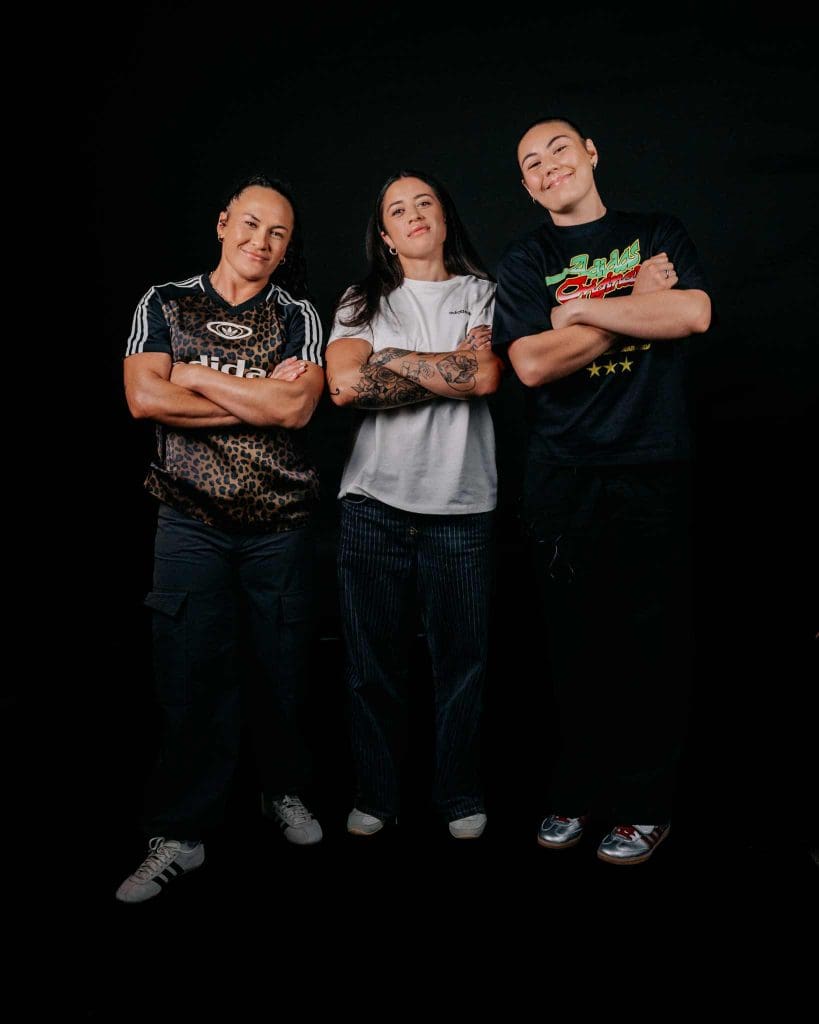
Leadership within a team often means knowing when to step up and when to create space for others to rise. How have you personally fostered inclusion and cohesion within your team, and what advice would you give to those leading in industries still catching up?
KV: I consider one of my strengths to be inclusivity, so I find I don’t really struggle with that too much. To me, it’s really important that every single person on the team knows that there’s a place for them. Ruby Tui always talks about how there’s a position for every single body, and there’s a belonging for every person that comes from all different backgrounds. That’s something we’re really good at in women’s sport – the constant reminder that there’s a place for everyone here. If I can encourage any leader in any business, it’s the need to constantly remind those who work for you, or who work around you, that there’s a place for them. And you don’t have to fit into a certain stereotype or fit into a certain idea of what an athlete should look like, or what a person should look like, to belong. I really take pride in encouraging the narrative that there is a place for everyone, wherever you go.
MAIA: I’ve been in leadership positions since I was quite young – I’m still quite young and I’ve found that that has come with learning how to share that load. I know my strengths and I learn where other people’s strengths are. So I find a bit of delegation helps other people to grow. I think that can be seen in both sport and business; the main thing is knowing your strengths and getting to know your team, and connecting with your team so that you can really understand their strengths and where they can bring more of their superpowers into your environment.
Setbacks are part of the story – whether you’re on the field, in a boardroom, or leading through change in any industry. Can you share a moment when you had to bounce back, and how that experience reshaped your understanding of resilience?
KV: I had quite bad mental wellbeing as a teenager and struggled with self harm; there were moments where I didn’t even think I’d be here today, so it’s pretty special that I get to live my dreams. My Whānau were incredibly supportive of me, but I didn’t accept the help. I just thought I could do everything on my own, but a real defining moment for me, and what taught me determination, was their unwavering support for me and the constant want for me to heal and get better. I think that’s what taught me resilience. And so now I get to be here and do what I love.
MAIA: Dealing with injuries and niggles can be quite frustrating, especially as while you’re doing rehab, you see other people around you growing rapidly because they’re able to do things that you can’t. And so I think in those moments, it’s important to stay present and know that the journey that you’re on is for you, know that the work that you’re doing will be for a greater purpose and that once you can get back into it, you’ll be better off. Where you are currently is where you’re meant to be and if you keep working, then you’ll end up in the right spot, just focus on not getting in your own head too much about things you can’t control.
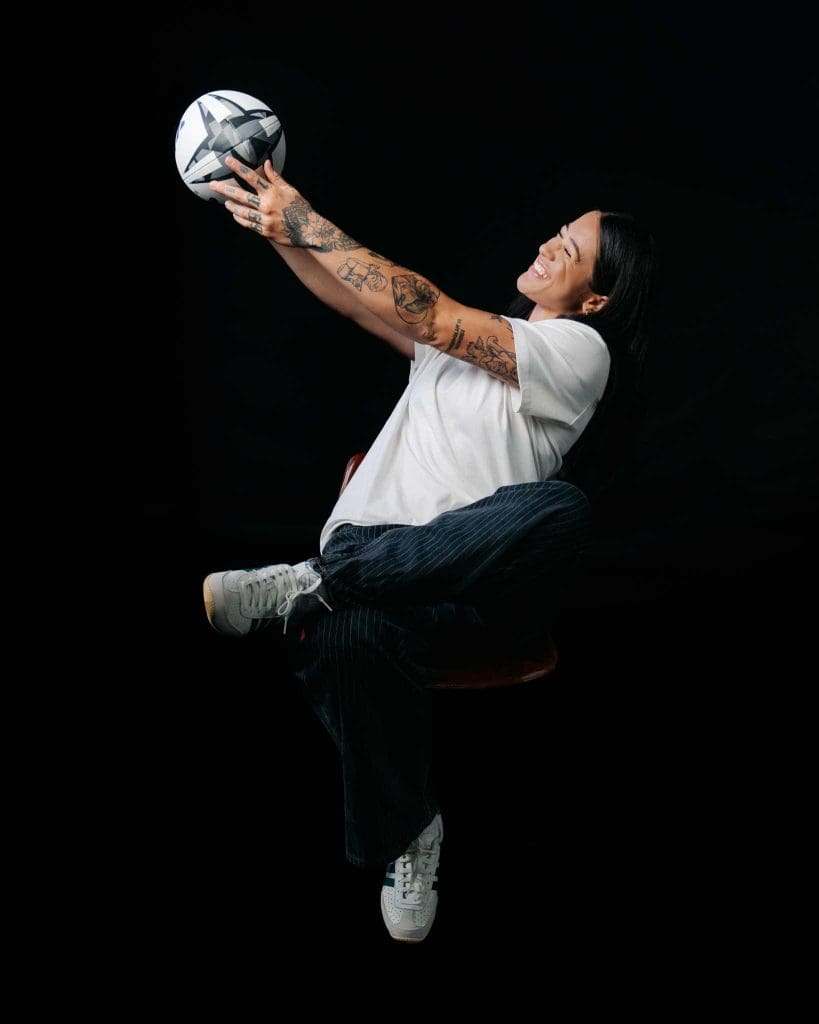
What does empowerment mean to you today – not just as an athlete or professional, but as a woman navigating systems that weren’t always built with you in mind?
KV: I feel empowered when someone tells me not to worry and encourages me to take time for myself. I feel empowered when I see athletes being themselves and putting themselves out there, because I know it’s really hard to do; it’s really hard to be yourself when there are so many different eyes on you. I find it empowering when women share stories about their culture, and where they come from, their traditions. I feel empowered through my own culture and through where I come from as a Polynesian woman. I’m really proud to be a Polynesian woman – that pride is where I feel my strongest.
MAIA: Empowerment, to me, means feeling like I belong, that there’s space for me and for the other women around me and that we’re not just here to be numbers. We’re here to lead. We’re here to create new paths and show that our views and our being is worthy and we’re able to do what we set out to do.
In uncertain times, motivation can waver – especially when the outcome isn’t guaranteed. What keeps you grounded, and how do purpose, team dynamics, and a sense of shared mission help you stay the course?
KV: What keeps me grounded personally is probably my “why”. I think my “why” for the first two years of Black Ferns was myself; I just played for myself, and it probably sounds really selfish, but I didn’t really play for my Whānau or anyone else. But as I’m growing in my purpose, I’m actually realising that my “why” is my Whānau and those around me, it’s a chance for me to honour all the gifts that I’ve been blessed with, by my family and by God. That’s what drives me now, that’s what makes me want to do this every day. One thing about our team is we really value service, we really value serving one another, we value serving our families, serving this country, it all comes back to service – those are the things that drive our team.
MAIA: I think motivation is something that is not there all the time, so shouldn’t it be something that you rely on. One of our team’s key values is service, and when you think about service, it’s the way you can help the people beside you. So even if you’re not feeling great or maybe you aren’t at your best and you don’t have that motivation, the little kick you might get from serving others and helping them to be at their best and seeing them at their best through your contribution is quite fulfilling. I find that keeps me grounded – just knowing that even if I’m not at my best, I can still help others in that space.
Across your journey, what’s one lesson about resilience or growth you wish you’d learned earlier – and what would you say to the next generation of women ready to break their own barriers?
KV: One thing that I’ve learned is that you could be the fittest or the strongest or the most physical person on the team, but if you don’t have confidence in yourself, it’s actually not going to do anything for you. My assumption coming into rugby was that it was all about physical performance until I started playing at this level, and suddenly I was feeling doubt about believing in myself. It’s so hard to serve a team and serve a business if you don’t actually believe that you can do it. And so if I could encourage any young person, I would say, as much time as you give to your training, give that same amount of time to your confidence and to working on the belief that you have in yourself. That’s what separates great athletes from good ones, and that’s where I strive to be.
MAIA: One thing I’m learning about growth is that it’s not comfortable. Change is not comfortable. Growth is really grumbly, and it’s not linear. It happens in all directions, and in order to break barriers, you’re going to have to work. And it’s not going to be fun at all times, but it’s so, so worth it. Just being able to prove to yourself that you can do things you didn’t think you were capable of is a blessing in itself.
